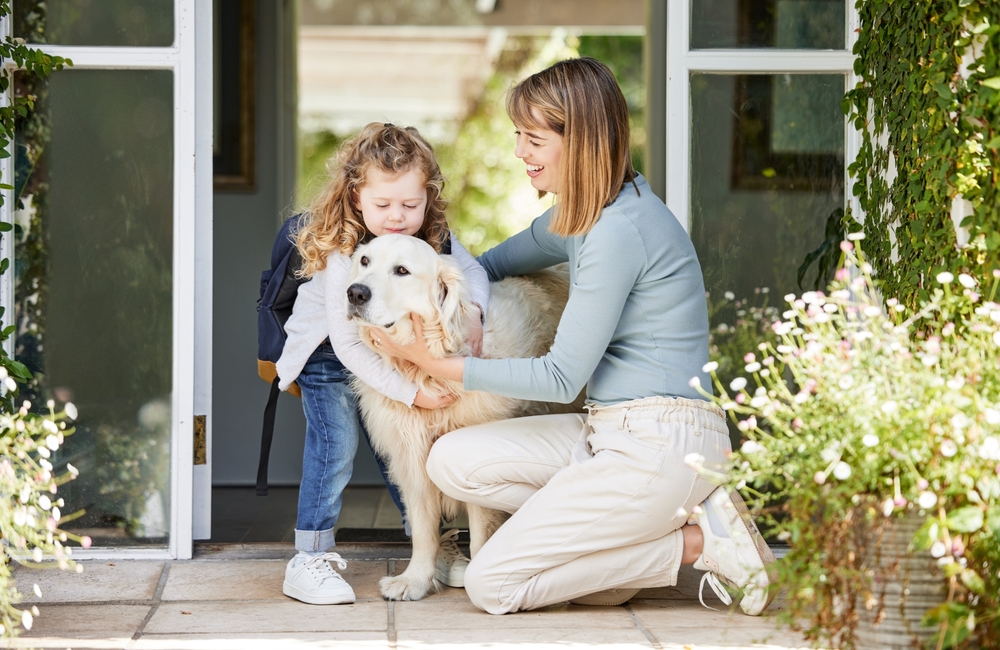Choosing the right furry family member isn’t just about finding a cute face; it’s about finding a dog whose personality and needs align with your family’s lifestyle. A well-suited pet can bring joy, companionship, and a bit of delightful chaos into your home. Let’s dive into the art of selecting a canine companion that fits your family vibe perfectly.
1. Assess Your Family’s Energy Level

Matching energy levels between your family and a dog is crucial. If you’re a bunch of couch potatoes, a hyperactive Border Collie might not be the best fit. Conversely, if you’re always on the move, a low-energy breed like a Bulldog may struggle to keep up. Consider how often you can commit to walks, playtime, and other activities. A harmonious energy match ensures your pup won’t be bouncing off the walls when you’re trying to wind down, and the opposite isn’t true either.
2. Consider the Kids

Kids and dogs can be the best of friends, but not all breeds are as kid-friendly as you’d hope. If your family includes young children, opt for a dog known for its gentle and patient nature, like a Labrador Retriever or a Golden Retriever. These breeds tend to be tolerant of little hands and enthusiastic play. Involving the kids in the process can also help create a bond from the start, giving them a sense of responsibility and companionship.
3. Factor in Your Living Space

Your living situation plays a big role in determining the ideal dog breed for your family. Apartment dwellers might find smaller breeds, such as French Bulldogs or Dachshunds, more suitable. In contrast, those with spacious backyards might be more inclined to adopt a larger breed like a German Shepherd. Consider your home’s size, access to parks, and neighborhood rules about pets when making your decision. A well-chosen dog will feel at home in your space.
4. Think About Grooming Needs

Grooming requirements vary widely among different breeds and can significantly impact your daily routine. If you prefer a low-maintenance pet, look for breeds with short coats like Beagles or Boxers. Conversely, if you don’t mind regular grooming sessions, a breed like a Poodle or Shih Tzu can be a good fit. Regular grooming not only keeps your dog looking sharp but also ensures their comfort and health, reducing shedding and preventing matting.
5. Evaluate Temperament

Every dog breed comes with its set of typical personality traits. Some dogs are naturally independent, while others thrive on constant companionship. If you’re looking for a laid-back buddy, a Basset Hound might be your match. On the other hand, if you want a playful partner, consider a Dalmatian. Knowing the general temperament of a breed can help ensure that your new addition meshes well with your family’s dynamics and enhances your day-to-day life.
6. Weigh the Financial Commitment

Owning a dog involves more than just buying kibble. From veterinary bills to grooming and training, costs can add up quickly. Larger breeds often incur higher expenses due to increased food consumption and potential health issues. Consider your budget and assess whether you can comfortably afford the ongoing costs associated with dog ownership. A clear understanding of the financial commitment helps prevent stress down the road and ensures your dog’s needs are consistently met.
7. Consider Allergies

Allergies can play a significant role in deciding which dog breed is best suited for your home. Hypoallergenic breeds like Poodles and Bichon Frises produce fewer allergens and can be more suitable for families with allergy concerns. Conducting a family allergy test or spending time with various breeds before committing can help prevent discomfort and ensure everyone can enjoy their new furry friend without sneezing fits or itchy eyes.
8. Research Breed Lifespan

Different breeds have varying life expectancies, which can influence your decision if you’re thinking long-term. Small dogs like Chihuahuas often live longer than larger breeds, such as Great Danes. Understanding the potential lifespan can help you plan for the future and prepare for the emotional commitment that comes with dog ownership. Acknowledging this aspect can create a deeper bond and appreciation for the time you’ll share with your new companion.
9. Gauge Your Patience for Training

Some breeds are naturally more trainable and eager to please, while others possess a stubborn streak. If you’re new to dog training, consider breeds known for their intelligence and willingness to learn, like Border Collies or German Shepherds. These dogs often respond well to commands and can quickly adapt to household rules. On the other hand, if you prefer a challenge, a more independent breed could keep you entertained and engaged with training.
10. Reflect on Your Lifestyle

Your lifestyle—whether you’re a homebody, frequent traveler, or outdoor enthusiast—should align with your choice of a breed. Dogs such as Huskies thrive on outdoor adventures, while breeds like the English Bulldog are content lounging at home. Reflect on your typical schedule and how a dog would fit into your daily routine. Aligning your lifestyle with your dog’s needs ensures a harmonious relationship and prevents future conflicts or stress.
11. Explore Rescue Options

Adopting from a shelter or rescue organization can be a rewarding experience that provides a deserving dog with a loving home. Many mixed-breed dogs are available, each with unique qualities that might suit your family perfectly. Shelter staff can often provide insight into a dog’s temperament and needs, helping you make an informed decision. Plus, adopting a rescue dog often creates a deeper bond as you provide them with a second chance.
12. Test Compatibility with Other Pets

If you have existing pets, it’s crucial to consider how a new dog will fit into the mix. Some breeds are more sociable and can seamlessly integrate into a multi-pet household, while others may prefer being the sole focus of attention. Arrange meet-and-greet sessions between your current pets and potential adoptees to observe their interactions. Ensuring compatibility from the start promotes a peaceful and loving home environment for all your furry family members.
13. Evaluate Your Commitment

Owning a dog is a long-term commitment that requires time, energy, and dedication. Assess whether your family is ready to take on the responsibility of daily walks, playtime, and general care for the next 10 to 15 years. If you’re unsure, consider fostering a dog to gauge your readiness for permanent ownership. Being honest about your willingness to commit ensures that your future dog will receive the love and care they deserve throughout their life.
14. Prepare for Surprises

Even the best-laid plans can result in surprises, as dogs often develop unique quirks and behaviors as they grow. Embrace the unpredictability, and be prepared to adapt to new challenges and adventures. Regular training and socialization can help manage unexpected behaviors, but patience and flexibility are key. Approaching dog ownership with an open mind ensures that your family can adjust to life’s little surprises while maintaining a strong bond with your furry friend.
15. Trust Your Instincts

Sometimes, the right dog for your family is simply the one that feels right. Trust your instincts when meeting potential pets. Often, a special connection or gut feeling will guide you toward the perfect match. While research and preparation are essential, the emotional bond you feel with a dog can be the most significant indicator of a successful adoption. Listening to your heart can lead to a lifelong friendship filled with love, laughter, and companionship.
